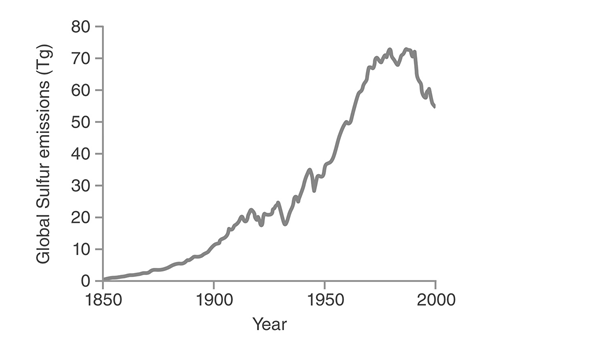Exam 3: Economics and Values
Give a brief overview of the terrestrial carbon cycle.Include the source of carbon that enters terrestrial ecosystems,how carbon moves through ecosystems,and how carbon ultimately leaves ecosystems.Explain how part of this cycle is believed to contribute to global climate change.
Plants take up CO2 from the atmosphere and then incorporate the carbon into sugars and tissues.
Animals then eat plants and gain organic forms of carbon that can be used for energy and for building tissues and molecules such as proteins and DNA.When animals and plants die,their tissues are metabolized by decomposers,and the partially degraded biomass especially from plants)is then deposited into soils,and eventually the material fully decomposes.At each stage along the way,some organic molecules are broken down,and carbon is released back to the atmosphere as carbon dioxide.The use of fossil fuels organic materials buried long ago)causes stored CO2 to be released to the atmosphere.This is occurring at very high rates and is contributing to global warming.
Cell respiration and photosynthesis are complex processes that _______________.
A
The artificial method of fixing atmospheric nitrogen for plant growth is called the ______________.
B
 -The trends depicted in the figure are best explained by__________ .
-The trends depicted in the figure are best explained by__________ .
Which one of the following statements about the carbon,phosphorus,and nitrogen cycles is true?
All of the following can be converted into acids in the atmosphere except______________- .
Which of the following naturally converts)atmospheric nitrogen into reactive nitrogen?
Which of the following elements is found in soils and rocks but is virtually absent from Earth's atmosphere?
What human activity contributes most to the release of sulfur into the atmosphere?
Production of which of the following is expected to decline around the middle of this century,as global deposits dwindle?
Since the beginning of the Industrial Revolution,the increased flux of carbon into the atmosphere has been primarily due to___________ .
Nitrogen fixation is a process that makes nitrogen available to plants and is carried out by___________ .
Which of the following carbon reservoirs contains the least carbon?
The largest pools of carbon in the carbon cycle are__________ .
The volume of Lake Erie is 480 km3.The main inflows into Lake Erie include the Detroit River and Buffalo River,and the main outflows include the Niagara River and Welland Canal.If the water level of Lake Erie remains level and the amount of water flowing into Lake Erie is 0.500 km3 per day,what is the approximate residence time for the water in Lake Erie?
Filters
- Essay(0)
- Multiple Choice(0)
- Short Answer(0)
- True False(0)
- Matching(0)